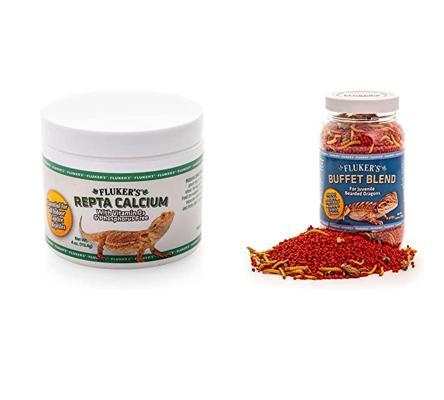Bearded dragons are popular pet reptiles known for their docile nature and unique appearance. As with any pet, it’s important to provide them with a balanced and nutritious diet. But what about fruits? Can bearded dragons eat oranges?
In this article, we’ll explore whether oranges are a safe and healthy option for your bearded dragon. We’ll also discuss the nutritional benefits and potential risks of feeding your pet oranges, as well as other fruits to consider adding to their diet.

Can Bearded Dragons Eat Oranges
Bearded dragons can technically eat oranges, but it’s not recommended. While they are not toxic, oranges have few nutritional benefits and can cause digestive issues. It’s best to avoid giving them oranges and stick to other fruits and vegetables instead. So, the answer is both yes and no.
Why Can’t Bearded Dragons Eat Oranges
Bearded dragons cannot eat oranges because they contain high levels of sugar, oxalic acid, and citric acids. Too much sugar can lead to various health issues such as diarrhea, obesity, and diabetes. The oxalic acid in oranges can combine with calcium and reduce its absorption, leading to metabolic bone disease.
Additionally, the acids in oranges can irritate the digestive system and cause dehydration. It’s best to avoid feeding bearded dragons oranges and other citrus fruits to ensure their good health.
The Nutritional Value Of Oranges
Oranges are not recommended for bearded dragons, but it’s still important to know their nutritional value. Here is a table that shows the nutritional data for oranges. The data is taken from the U.S. Department of Agriculture (USDA)
Nutritional Information Of Oranges Per 100g
Note: We Have Included The Most Relevant Nutritional Information Only
| Name | Amount | Unit |
|---|---|---|
| Water | 87.14 | g |
| Energy | 46 | Kcal |
| Protein | 0.7 | g |
| Total lipid (fat) | 0.21 | g |
| Carbohydrate, by difference | 11.54 | g |
| Fiber | 2.4 | g |
| Sugars | 9.14 | g |
| Calcium, Ca | 43 | mg |
| Phosphorus, P | 12 | mg |
| Sodium, Na | 0 | mg |
| Vitamin C | 45 | mg |
| Iron, Fe | 0.09 | mg |
| Vitamin D (D2+3) | 0 | µg |
| Vitamin B6 | 0.051 | mg |
| Vitamin A | 11 | µg |
| Vitamin E | 0.18 | mg |
| Vitamin K | 0 | µg |
Health Risks Of Feeding Oranges To Your Bearded Dragon
Feeding your bearded dragon oranges can have negative effects on their health. Here are some things to look out for:
1. High Sugar Content
Oranges, like other citrus fruits, have a high sugar content. Too much sugar in your beardie’s diet can lead to obesity, fatty liver disease, diabetes, and heart failure. It’s important to limit the amount of oranges your beardie consumes.
2. Loss of Teeth
Foods that are high in sugar and acid can cause tooth decay and loss of teeth in bearded dragons. Their teeth are fixed directly to their jaw, and tartar or plaque build-ups can cause inflammation or infection to their bones.
3. Diarrhea
The high levels of sugar and acidity in oranges can cause your beardie to have an upset stomach, leading to diarrhea and a loss of appetite. This can cause dehydration, which can make your beardie very sick. Dehydration due to feeding your beardie oranges is different from regular dehydration and can be harmful to their health.
4. Oxalic Acid
Oranges and other citrus fruit contain high amounts of oxalic acid, which can bind with calcium and cause calcium oxalate to form. This can lead to Metabolic Bone disease, which can cause soft bones, limb deformities, and paralysis. In severe cases, it can be fatal.
5. Citric Acid
The acids in oranges and other citrus fruit can negatively impact your beardie’s digestive system, causing diarrhea and eventually dehydration. This can be especially harmful to young or sick beardies.
6. Low Calcium Levels
All fruit is low in calcium, which is essential for your beardie’s health. Feeding them foods that are low in calcium and nutritionally poor can lead to health problems and metabolic bone disease. It’s important to ensure that your beardie is getting enough calcium through their diet to prevent these issues.
As a responsible owner, it’s important to monitor your beardie’s diet and ensure that they are getting the proper nutrition they need to thrive. Avoid feeding them foods that are high in oxalic acid or citric acid, and make sure they are getting enough calcium to stay healthy.
How to Safely Feed Oranges to Bearded Dragons
To safely feed oranges to your bearded dragon, offer them in moderation as an occasional treat. Use organic oranges and wash them thoroughly before removing the peel and seeds. Cut the orange into small, bite-sized pieces and offer it as part of a balanced diet that includes a variety of other fruits, vegetables, and live insects.
Make sure your bearded dragon is getting all the necessary nutrients in their diet, such as calcium and phosphorus.
How Many Oranges Can Bearded Dragons Eat
Bearded dragons should not eat too many oranges as they contain high amounts of sugar, acids, and vitamin C, which can cause digestive problems, calcium deficiency, obesity, and tooth decay. Oranges should only be fed to bearded dragons once or twice a month in limited amounts.
Can Bearded Dragons Eat Mandarin Oranges
Bearded dragons should not eat mandarin oranges because they have a high sugar content and contain oxalic and citrus acids that can be toxic to their health. Although mandarin oranges have good calcium to phosphorus ratio and vitamin C, it’s still not recommended to feed them to your pet.
Some sources claim that mandarin oranges are beneficial because of their calcium content, but the high sugar and acid levels outweigh any potential benefits. There are better and healthier ways to provide your bearded dragon with the calcium they need.
Alternatives to Oranges for Bearded Dragons
There are many alternatives to oranges that can provide beneficial nutrients for bearded dragons. Papaya, blueberries, butternut squash, collard greens, and mango are all good options. Papaya is high in Vitamin A and contains beneficial enzymes, while blueberries are a good source of antioxidants and Vitamin C.
Butternut squash is rich in beta-carotene and essential nutrients, while collard greens provide calcium and other important vitamins and minerals. Mango is also a good source of vitamins and enzymes that aid in digestion.
Can Bearded Dragons Eat Insects That Eat Oranges
Feeder insects that have eaten oranges can be fed to your bearded dragon, but it’s important to limit their intake to once or twice a week. While these insects are better able to digest the acid and sugar found in oranges, serving them oranges at every meal can harm your dragon. So, it’s best to stick to a balanced diet for both your dragon and their feeder insects.
Are Oranges Good For Bearded Dragons
No, oranges are not good for bearded dragons because they can increase the risk of diarrhea, which can lead to an increase in pinworms in their digestive tract. This can be dangerous for the beardie and other beardies in the same habitat, and even for you. It is recommended not to feed oranges to your beardie, but if you do, serve them in small portions at your own risk.
Can Bearded Dragons Eat Orange Peels
No, bearded dragons should not eat orange peels. They are difficult to digest and contain high levels of acid, oxalic acids, and orange oils that are harmful to your pet’s health. Orange peels may also contain chemicals that can be fatal to your bearded dragon.
Instead, feed your pet collard greens, turnip greens, beet greens, leafy greens, alfalfa plants, Chinese cabbage, dandelion greens, green cabbage, green beans, cuttlefish bone, and calcium supplements for a better food source.
Can Bearded Dragons Eat Orange Seeds
Bearded dragons should not eat orange seeds or any part of an orange regularly because they contain a high level of sugar that can harm their health. Only 10-20% of their diet should consist of fruits, and oranges should only be fed once or twice a month.
Other fruits like dragon fruits, strawberries, and raspberries can be fed occasionally, but the majority of their diet should consist of greens and insects. Mandarins are also not recommended because they contain harmful acids and sugar. It is important to monitor your pet’s diet to ensure they live a healthy life.
Can Bearded Dragons Eat Orange Juice
No, it’s not recommended to give orange juice to your bearded dragon. Orange juice may cause diarrhea and irritate the digestive tract due to its high fruit acid content. It’s also high in sugar, which can lead to obesity. Bearded dragons need calcium, which is lacking in most fruits, including oranges.
FAQs
What Happens If I Feed a Bearded Dragon Oranges?
If your bearded dragon eats a small amount of orange, it should be fine, but if it eats a lot, monitor its behavior for signs of gastrointestinal upset. If you notice any problems, offer plenty of fresh water and limit its food intake for a short time. In the future, offer oranges in moderation as part of a balanced diet and avoid foods with excessive citric acid. If you have concerns, consult a reptile veterinarian for specific recommendations.
Do Bearded Dragons Like Oranges?
Bearded dragons are omnivores and enjoy eating oranges, but they should not be fed too much of it. Oranges contain high amounts of water, sugar, oxalic acid, and citric acid, which can cause digestive irritation and lead to diarrhea or dehydration. It’s best to limit their citrus intake and make sure they have a balanced diet to avoid any health issues.
Are Oranges Safe for Bearded Dragons?
No, oranges are not safe for bearded dragons to eat. Oranges contain oxalic acid, which can bind with calcium and cause metabolic bone disease. They also have high levels of sugar, which can lead to obesity and other health problems. Additionally, the citric acid in oranges can irritate a bearded dragon’s stomach and cause digestive issues. It’s best to avoid feeding oranges to your pet.
How Much Orange Should I Feed to a Bearded Dragon?
Bearded dragons should not be fed citrus fruits like oranges frequently because they can cause health problems like diarrhea and dehydration. However, a little amount of low-acid oranges like mandarin can be given occasionally. Overfeeding oranges or any sugary food can cause obesity in bearded dragons, which can lead to serious health issues like fatty liver disease, prolapses, and organ dysfunction.
Can Bearded Dragons Eat Navel or Blood Oranges?
No, bearded dragons should not eat navel or blood oranges. Although they are high in calcium, these citrus fruits contain dangerous quantities of sugar and fruit acids that can harm your pet. It’s best to stick to safer fruits for bearded dragons.
Conclusion
In conclusion, while bearded dragons can eat oranges in moderation, it’s important to remember that they should never be the main staple of their diet. As with any food, always introduce new items slowly and monitor your beardie’s reaction.
With proper care and attention, your bearded dragon can enjoy a varied and healthy diet that includes a little bit of everything – including the occasional orange treat!


